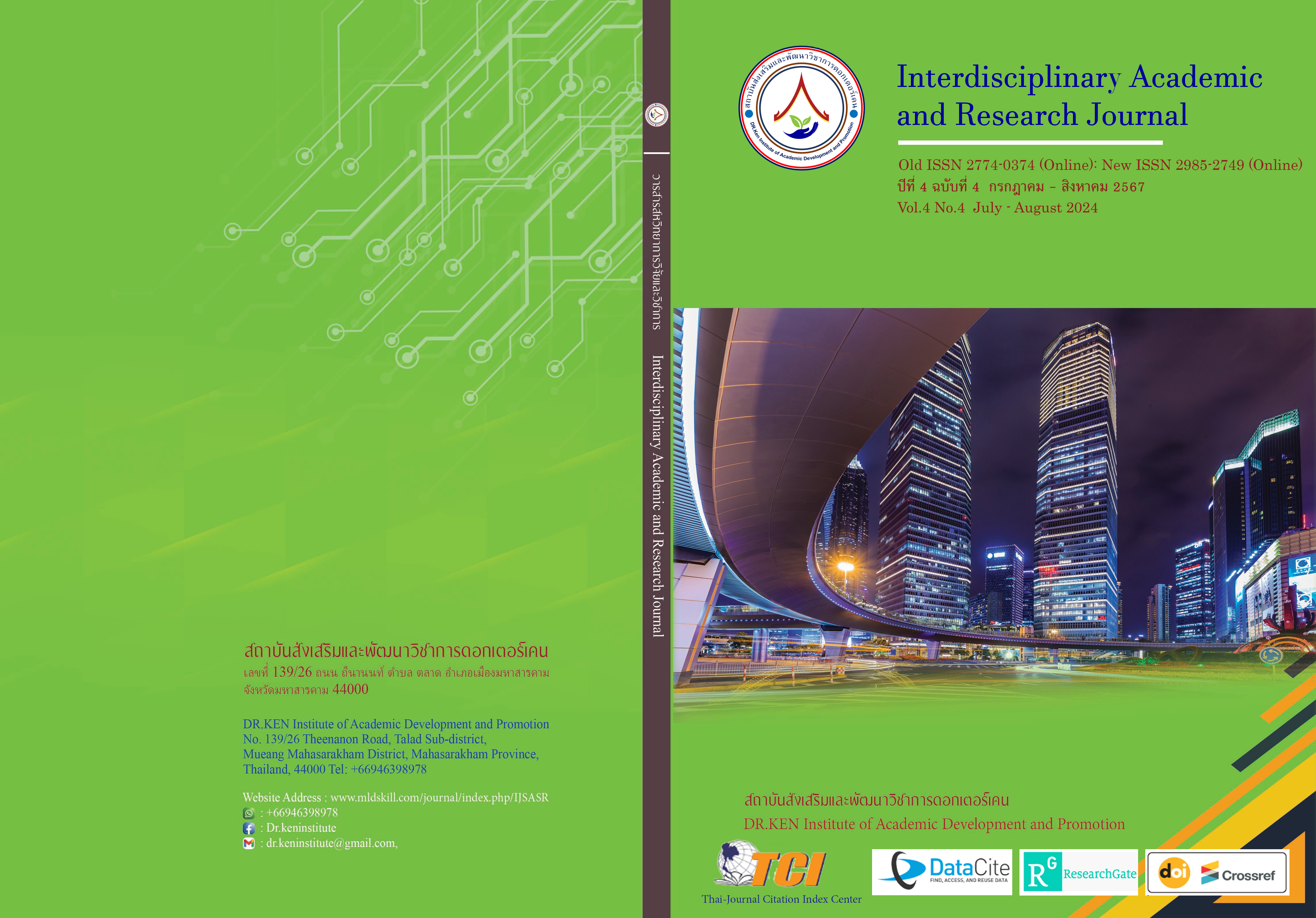Development of Learning Achievement in the English Course on Present Simple Tense by using a Task-based Learning Model for Students of 6th Level of Primary Education
DOI:
https://doi.org/10.60027/iarj.2024.277210Keywords:
Development of Learning Achievement; , Learning Management; , Task-Based LearningAbstract
Background and Aims: Present Simple Tense is fundamental to learning English. If a student does not understand the basics of English, a teacher must strengthen that student with a solid foundation by making him or her understand grammar so that the student can develop language skills, and also extend knowledge of Present Simple Tense to other tenses. This research aims to 1) Develop task-based learning plans about Present Simple Tense for students under the 6th level of primary education, 2) Compare academic achievement in Present Simple Tense before studying and after studying with the adoption of task-based learning model among students under the 6th level of primary education.
Methodology: This is a quasi-experimental research with a one-group pretest-posttest design. The target group included one class of six students studying English at the 6th level of primary education at Anubanthachang School, Tha Chang District, Sing Buri Province, in the 2nd semester of the academic year 2023. The research instruments comprised nine task-based learning plans, 2 hours each, totaling 18 hours, and an academic achievement test after using the task-based learning model, which contained 30 questions with 4 multiple-choice questions each. Statistics for analysis included average and standard deviation.
Results: 1) Results of learning plan development were that nine task-based learning plans of Present Simple Tense and ten tasks accompanying the learning plans were built, 2) Regarding comparing learning achievement on Present Simple Tense, it was found that students who have passed activities using a task-based learning model gained higher academic achievements after studying (average of 24.04 with a standard deviation of 1.20) than before studying (average of 16.30 with standard deviation of 3.26).
Conclusion: This research shows that the task-based learning model is a learning model that mainly concentrates on tasks by using activity-centered learning. A student will learn content through activities and practices on his own while a teacher guides tasks, which will help increase the student’s learning performance and achievement.
References
ชำนาญ กฤตพงศ์ มูลมี. (2560). การพัฒนาความสามารถด้านการพูดภาษาจีนโดยการจัดการเรียนรู้แบบเน้นภาระงาน (Task-Based Learning) ของนักเรียนชั้นมัธยมศึกษาปีที่ 5. วารสารศึกษาศาสตร์ มหาวิทยาลัยขอนแก่น, 40(2), 73-79.
มธุรส ข่มจิตร์, และวิภารัตน์ แสงจันทร์. (2559). การพัฒนารูปแบบการจัดการเรียนรู้ที่เน้นภาระงานเป็นฐานรายวิชางานบ้านของนักเรียนระดับชั้นมัธยมศึกษาปีที่ 2 โรงเรียนสาธิตแห่งมหาวิทยาลัยเกษตรศาสตร์ ศูนย์วิจัยและพัฒนาการศึกษา. วารสารศึกษาศาสตร์ปริทัศน์, 31(1), 135-146.
สยามรัฐ จิตแจ้ง และอาบีเกล มีลาด เอสเซี่ยน. (2564). การพัฒนาความสามารถด้านไวยากรณ์ภาษาอังกฤษ เรื่อง Present Simple Tense ของนักเรียนระดับชั้นมัธยมศึกษาปีที่ 1 โรงเรียนวัดเขมาภิรตารามโดยใช้บัตรคำ. วารสารวิชาการครุศาสตร์สวนสุนันทา, 5(2), 57-65.
สิรินาถ ธารา. (2558) การพัฒนากิจกรรมการอ่านเน้นภาระงานเพื่อเสริมสร้างผลสัมฤทธิ์การอ่านภาษาอังกฤษอย่างมีวิจารณญาณ สำหรับนักเรียนชั้นมัธยมศึกษาปีที่ 5. Veridian E-Journal, Slipakorn University, 8(2), 1361-1376.
Branden, N. (2005). Fighting social inequity through enhancing the quality of language education in Task-based language teaching. Paper presented at the Opening lecture at TBLT 2005 International, New York.
Doughty, C., & Pica, T. (1986). Information Gap Tasks: Do They Facilitate Second Language Acquisition? TESOL Quarterly, 20(2), 305-325
Ellis, R. (2003). Task-based language Learning and Teaching. Oxford: Oxford University Press.
Post, R., & Rathet, I. (1996). On their own terms: Using student native culture as content in the EFL classroom. English Teaching, 34(4), 12-17.
Promyat, B., & Kositchaivat, S. (2023). The Effect of the Task-Based Learning to Improve English Speaking Skills of Seventh Graders. Journal of Philosophical Vision, 28(2), 162-172.
Schmidt, R. (1993). Awareness and Second Language Acquisition. Annual Review of Applied Linguistics, 13(3), 206-226.
Willis, J. (1996). A framework for task-based learning. Harlow, U.K.: Longman Addison- Wesley.
Willis, J. (2007). Doing Task-based Teaching. Oxford: Oxford University Press.
Willis, J., & Willis, D. (2012). Doing Task-Based Teaching. Oxford: Oxford University Press.
Downloads
Published
How to Cite
Issue
Section
License
Copyright (c) 2024 Interdisciplinary Academic and Research Journal

This work is licensed under a Creative Commons Attribution-NonCommercial-NoDerivatives 4.0 International License.
Copyright on any article in the Interdisciplinary Academic and Research Journal is retained by the author(s) under the under the Creative Commons Attribution-NonCommercial-NoDerivatives 4.0 International License. Permission to use text, content, images, etc. of publication. Any user to read, download, copy, distribute, print, search, or link to the full texts of articles, crawl them for indexing, pass them as data to software, or use them for any other lawful purpose. But do not use it for commercial use or with the intent to benefit any business.
















.png)


